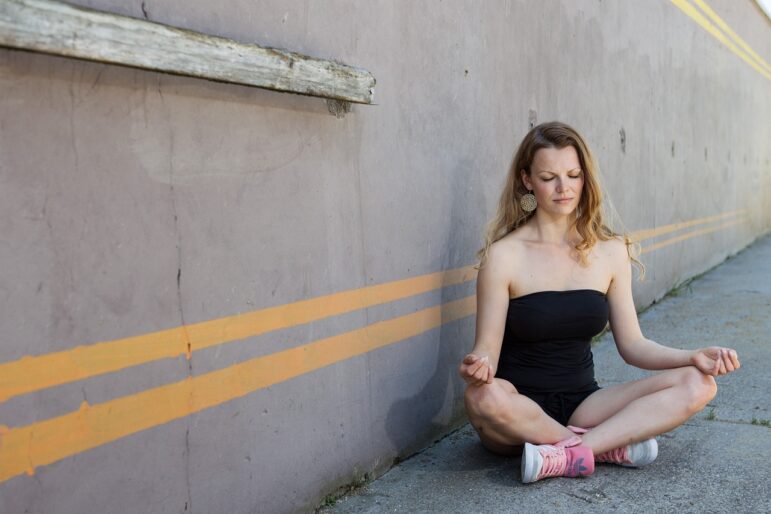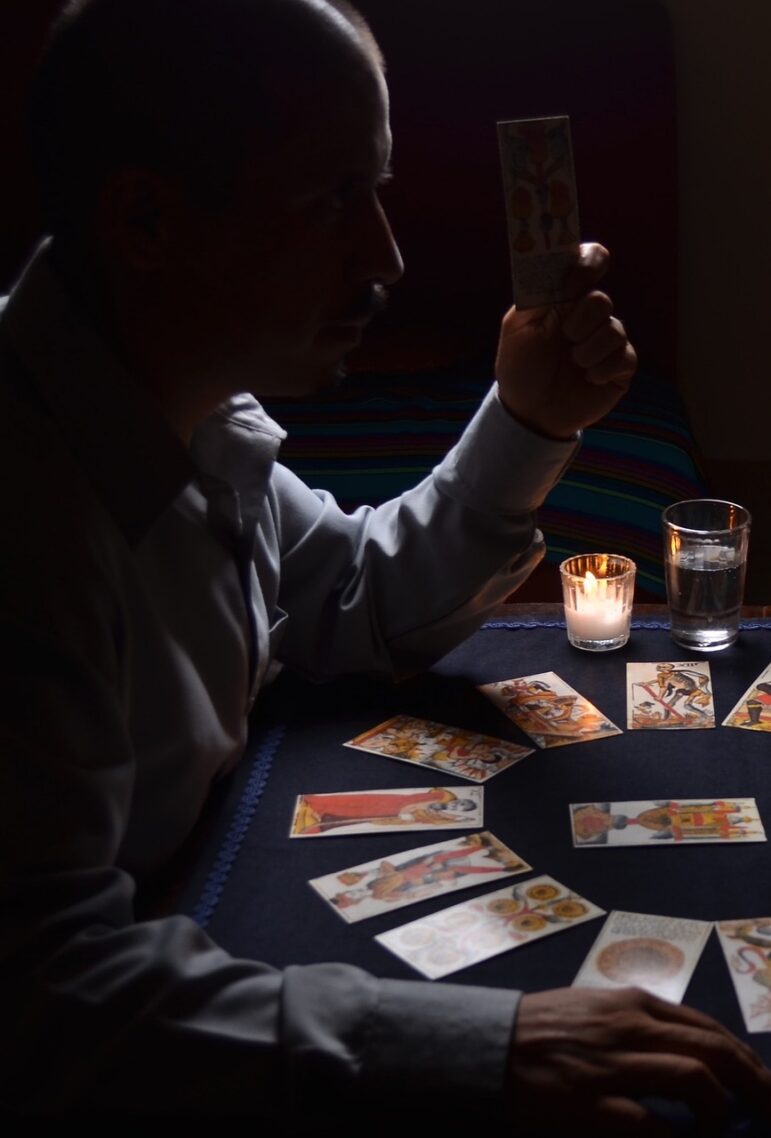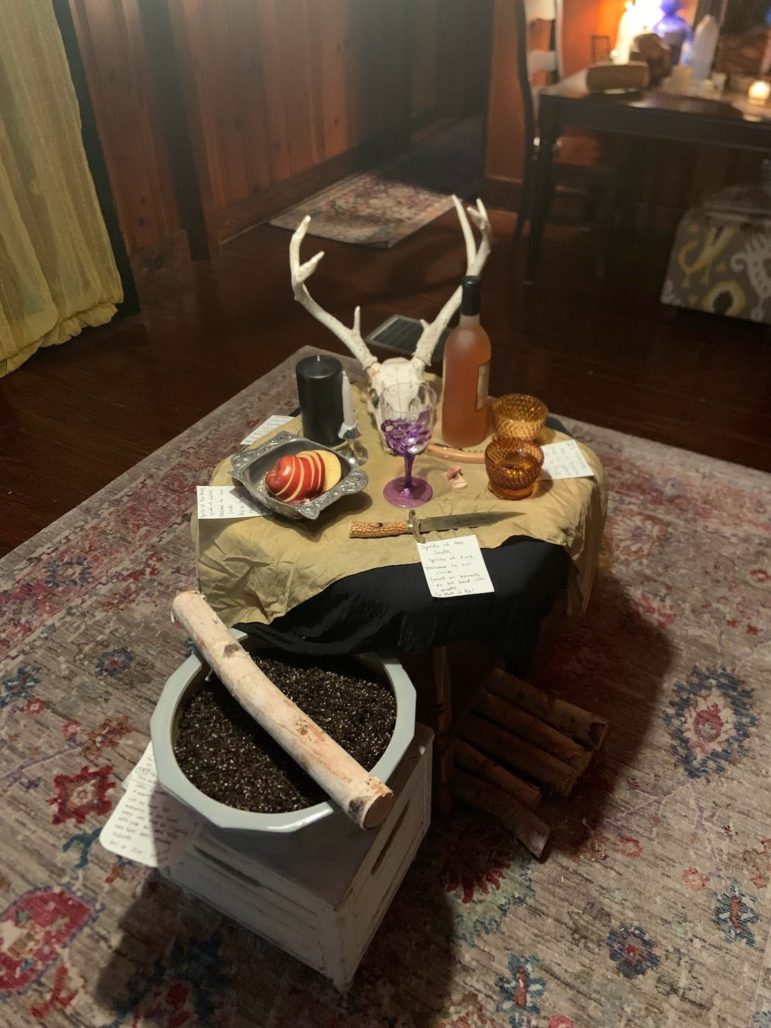

Halo Quin [courtesy]
Readers who saw my recent article on creating rituals will know I am a Witch with ADHD (i.e. “Attention Deficit Hyperactivity Disorder”), and I love rituals! But after the ritual is done and I go home, I want to take that magic with me, and to get better at it, of course.
This is where the personal magical work comes in, and the first thing anyone suggests, rightly so, is a daily practice.

A woman mediates sitting outside on a sidewalk [Pixabay]
I know that daily practice is important – like exercise that keeps our body healthy, regular magical practices like meditation, visualisation, breathwork, grounding, prayer, and making offerings strengthen our ability to do magic and our spirit relationships.
But if I’m not careful I can forget to eat regularly, let alone anything else!
Daily practice definitely requires effort, but it also isn’t meant to cause more stress than joy and, with the working memory and attention issues that come with an ADHD brain, daily practice done wrong can be downright painful. Partly because everyone says we should just do it, and the shame around not being able to do this apparently simple thing makes just thinking about it feel like an impossible task.
And I know some are thinking: “Well if it really mattered to you, you’d just do it!” (I know some think this because I’ve thought it too). Unfortunately, that’s not true, and this is why ADHD is a disability: it has impacts on our lives. But just as I can use a walking cane to go further than my dodgy joints allow unsupported, I can also use techniques to support myself in managing my ADHD brain.
And so I’ve built a daily (ish) practice which supports me, strengthens my skills, and works with my brain instead of against it! It changes over the years, when life has plot twists or my work shifts, and so at each point I rebuild it accordingly. This has worked for me for many years now.
Here are some key things to consider when creating a daily practice that will help those of us with distractable neurodivergent brains (and pretty much everyone else) practice more consistently:
- Interest
- Novelty and Variety
- Minimising barriers (including stress and shame)
- Reminders and cues
Let’s break these down.
Make it interesting to you!
If you are not interested in a practice, why would you spend time doing it? For ADHD brains this is especially important – this is, in short, to do with brain chemistry around what motivates us and what prompts our brains to create the neurotransmitters we need to function.
My daily practice must involve the beings that I love to work with, and practices that support the skills I’m most interested in. My main daily practice includes making offerings to keep my connection with my gods and spirits strong, and prayers to tune into their energy and honour them. For me, those relationships are fundamental.
So ask yourself – what is it that interests you in magic? What do you value? Why do you want to practice in the first place? Then, pick something that reflects what matters to you.
If you’re working in a specific tradition, you might be given a set of practices that you are expected to do. Personally I find it really helpful to know why I’m being asked to do them and then I consider how it serves that which I value.
Novelty and Variety
This seems counterintuitive to the idea of a daily practice – how can you have novelty and variety in something that is supposed to be so consistent that you do it every day? Well, what aspect needs to be consistent? Beyond the practice of discipline in showing up, what are you actually working on?
Once you know your reasons for doing daily practice, then you can make a list of what you actually want the results to be. And then ask yourself, “what techniques can get me those results?”

A figure in shadows looks over a candlelit tarot spread [cansecotarot, Pixabay]
For example, for me it is keeping those divine relationships fed, so I prioritise those, but there are different ways to nourish a relationship. In the same way, if someone wanted to improve their visualisation skills, they could:
- Practice holding images in their mind.
- Take imaginative journeys in their mind’s eye.
- Pick a tarot card and study it, then close their eyes and picture as many details as they can.
- Work with a deity, planetary spirit, or angel and ask for their support.
- Employ an energetic healing practice to clear blocks in the third eye.
And so on! Once you have a list you can pick one to do until you get bored, or after a set amount of time like a moon cycle. Then choose a different thing on your list.
This is a way to give yourself variety and employ the benefits of novelty, while training up the skill you desire, and proving to yourself that you can show up consistently. And it might be that you eventually settle on three practices that are perfect for you and you do them for years! The key is to find what works for you.
Minimising Barriers
With everything in life, the fewer barriers there are to do something the more likely we are to do it. Daily practice is the same.
Simply put, if you’ve decided that you want to pull a tarot card every morning, then make sure your tarot deck is easy to reach from your bed!
If you want to meditate, then consider what kind of meditation suits you – for some people music really helps, or movement. For others stillness is required. Experiment and find out which one feels best so that you aren’t trying to do something that you actually don’t want to do.
Self-forgiveness is so important here too. It took a long time for me to trust that I was committed enough to my practice, as I wanted to be perfect with it and then kept forgetting, or getting distracted, or my routine would change and I’d lose the thread. But when I stressed about it, the shame made daily practice feel bad, and so I started to resent it. It felt like an obligation, rather than what it was – the magic that I love. Lifting this emotional barrier by softening the drive to be perfect, forgiving my younger self, and by checking in with my spirits on what they actually needed from me, meant that there was one less thing in the way.
On the subject of perfectionism: it’s also tempting to jump in and start with a big, fancy practice! If you’ve felt the power of an intricate ritual you might be tempted to try replicating that with your daily practice. Please don’t. Big rituals are wonderful, but best kept for when you have extra time and energy to do them justice. Instead, pick something small to start with. For daily practice, you’re working on building something that is easy to do daily, that becomes part of your routine (or even a habit), and the best way to begin is to add one small thing that you can build on later.
Reminders and Cues
Habit and routine building is easiest to do when we’re adding things into a structure that is already there. If there is something you do every day – like wake up, or open the curtains, or get a cup of tea – you can use that as your cue for the practice you want to start. (Once you’ve got a practice in place, that might become you cue for adding another one, or you might find that it fits best elsewhere.)
For example, I say my morning prayer to the cosmos when I open the curtains. I pour an offering for the ancestors when I first make a cup of tea that day.
I travel a lot and my daily routine shifts around, so when these cues don’t happen the practice may not happen, and that’s okay, but I do them most places I end up, so they’re fixed points in most of my days that I have hung magic on.

Sabbatsmeet Samhain altar, 2022 [E. Scott]
I also love altars! I have altars and magical talismans around my flat and when I see them, I have actions associated with them. I connect with my local land spirits when I pass one altar. Consider tactile or audible reminders too like wind chimes, touch-stones, and alarms that you set (make sure you label them so you know why they’re going off!)
Make sure that you change your reminders when they start to blend into the background – reorganising your altars at the festivals can be really helpful for reintroducing novelty!
And remember to write down your favourite prayers and practices. I have a pocket notebook that travels with me. If I’ve changed my practices for a while and forgotten, or I’m in a different place, I can flick through and remind myself of those things that really help me reconnect.
Build your Daily Practice
Let’s recap!
- Why do you want to do daily practice? What matters to you?
- Which practices might work for that?
- Pick one practice for now, and give yourself permission to change it when you need to.
- What do you need to do to make it easy?
- Choose a part of your routine that might be a good cue.
- Choose something to remind you to do it – a note on your morning alarm, your tarot deck visible when you wake up, an offering bowl next to the kettle.
- Give it a go!
- When things start to feel stale, switch the practice, change your reminders, and give yourself permission to be imperfect.
Some Final Thoughts
Neurodivergent folk are often very creative, and one of our strengths is the ability to think outside of the box, so I invite you to take the suggestions above and experiment! What works for you? What doesn’t?
If you’re not sure what to start with here are some common practices to choose from:
- Daily divination – a tarot card, rune, or ogham.
- Meditation – moving or sitting – to strengthen your Will and clear your mind.
- Chanting – mantras, songs, or improvisation – to invoke the magic you choose.
- Breathwork to explore trance and energy movement.
- Prayers and Offerings to build magical relationships.
- Grounding and Personal Protection visualisations to strengthen your shields.
- Self-anointing to remember your sacred nature.
Finally – this doesn’t work for everyone – I like to rename it “regular practice” instead of “daily practice.” Sometimes taking the pressure off can really help us to do things more often.
Remember that this is your magic and no one else’s, so you get to pick things that are supportive for you. Your magic should bring you joy and healing, and need not be an obligation, so let it be fun, let it be easy, and let it be set up to fit into your life.
Then it will move from a “should” to a “regular thing” to a “daily (ish) practice”. And before you know it, you’ll realise you’re weaving your magic into each and every day.
The Wild Hunt is not responsible for links to external content.
To join a conversation on this post:
Visit our The Wild Hunt subreddit! Point your favorite browser to https://www.reddit.com/r/The_Wild_Hunt_News/, then click “JOIN”. Make sure to click the bell, too, to be notified of new articles posted to our subreddit.